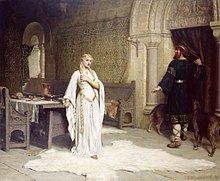
Lady Godiva, in Old English Godgifu, was a late Anglo-Saxon noblewoman who is relatively well documented as the wife of Leofric, Earl of Mercia, and a patron of various churches and monasteries.

Leofric was an Earl of Mercia. He founded monasteries at Coventry and Much Wenlock and was a very powerful earl under King Cnut and his successors. Leofric was the husband of Lady Godiva.

Coventry, a city in the West Midlands, England, grew to become one of the most important cities in England during the Middle Ages due to its booming cloth and textiles trade. The city was noted for its part in the English Civil War, and later became an important industrial city during the 19th and 20th centuries, becoming the centre of the British bicycle and later motor industry. The devastating Blitz in 1940 destroyed much of the city centre, and saw its rebuilding during the 1950s and 60s. The motor industry slumped during the 1970s and 80s, and Coventry saw high unemployment. However, in the new millennium the city, along with many others saw significant urban renaissance and in 2017 it was announced that the city had been awarded the title of 2021 UK City of Culture.
Godiva or Lady Godiva was an Anglo-Saxon noblewoman who, according to legend, rode naked through the streets of Coventry, in England, in order to gain a remission of the oppressive taxation imposed by her husband on his tenants.

The Godiva Festival is a three-day music festival held each year in the War Memorial Park, Coventry, England, named after the city's famous former inhabitant Lady Godiva. It first appeared as a day-long event in 1997 and became a three-day event the following year in 1998. It is the largest family music festival in the UK, and is made up of two fields; a Main Field and a Family field, which each offer a different experience.
"The Godiva Affair" is the fourth episode of the seventh series of the British comedy series Dad's Army. It was originally transmitted on Friday 6 December 1974.
The Godiva Procession is an annual procession in the city of Coventry, England, which re-enacts the story of Lady Godiva. Godiva Processions have been held in Coventry since the 17th century.

Lady Godiva of Coventry is a 1955 American Technicolor historical drama film, directed by Arthur Lubin. It starred Maureen O'Hara in the title role. Alec Harford, the English actor who portrayed Tom the Tailor, died eight months before the film's release.
Godiva Fire Pumps was an offshoot from Coventry Climax, directed by Charles Pelham Lee, son of Leonard Pelham Lee.

Lady Godiva: Back in the Saddle is a 2007 British comedy film directed by Baz Taylor and starring James Fleet, Caroline Harker and Phil Cornwell. It follows a teacher who attempts to stop an American gangster and a corrupt mayor building a casino on the site where Lady Godiva once rode in Coventry.

St Mary's Priory and Cathedral was a Roman Catholic institution in Coventry, England, founded in the 12th century by transformation of the former monastery of St Mary, and destroyed during the Dissolution of the Monasteries in the early 16th century. It was located on a site north of Holy Trinity and the former St Michael's parish churches in the centre of the city, on a site bordered by Priory Row to the south, Trinity Street to the west, and the River Sherbourne to the north. Excavated remains from the west end of the cathedral are open to the public.

St Mary's Hall is a municipal building in Bayley Lane in Coventry, West Midlands, England. It is a Grade I listed building.

Alfred Joseph Woolmer (1805–1892) was an English painter whose subject matter covered the literary and historical genre. He was exceptionally prolific and, by age sixty, the number of works he had exhibited had reached 355 at the Society of British Artists, 45 at the British Institution, and 12 at the Royal Academy.

David Gee was an English oil painter who took his inspiration from the local area.
"Lady Godiva" is a popular song originally recorded and released in 1966 as a single by British pop duo Peter and Gordon. Though it only made it to No. 16 in the UK, it became one of the duo's greatest successes in the United States, rising to No. 6 in December 1966.

Alfred Robert Grindlay CBE, JP was an English inventor, industrialist and official during the 19th and 20th centuries. He co-founded Grindlay Peerless, the motorcycle engineering company and was Mayor of Coventry during WWII and the Coventry Blitz.

Lady Godiva is an 1897 oil-on-canvas painting by English artist John Collier, who worked in the style of the Pre-Raphaelite Brotherhood. The portrayal of Lady Godiva and her well-known but apocryphal ride through Coventry, England, is held in Coventry's Herbert Art Gallery and Museum.

Lady Godiva is a 1921 German silent historical film directed by Hubert Moest and starring Hedda Vernon and Eduard von Winterstein.

Lady Godiva is a 1911 American silent historical drama film directed by J. Stuart Blackton and produced by Vitagraph Studios in Brooklyn, New York. Its scenario is based on a legendary incident in the life of Godiva, Countess of Mercia, who lived in England during the mid-11th century. Allegedly, the Anglo-Saxon noblewoman rode naked—covered only by her long hair—through the streets of Coventry to protest and abolish an oppressive tax imposed on that town's residents by her husband, Leofric, Earl of Mercia. The film, copies of which survive today, stars Julia Swayne Gordon in the title role with a supporting cast including Robert Maillard, Harold Wilson, and Kate Price.

Self Sacrifice, better known as the Lady Godiva statue is an equestrian statue of Lady Godiva in Broadgate, Coventry. The statue is bronze, on a plinth of Portland stone.
















